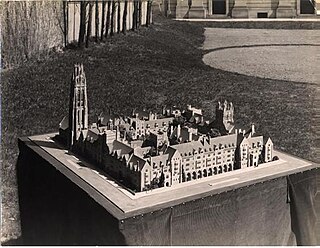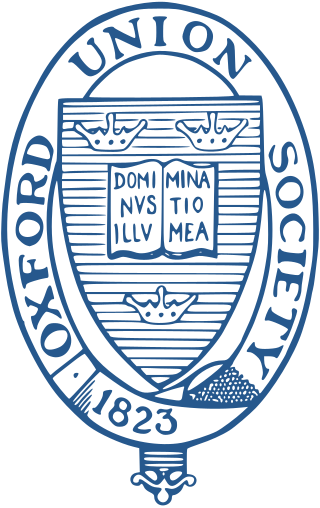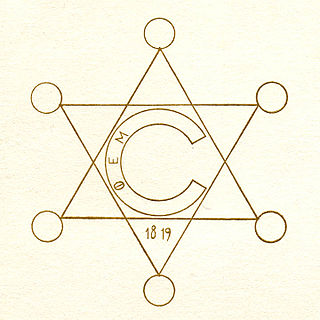
Yale College is the undergraduate college of Yale University. Founded in 1701, it is the original school of the university. Although other Yale schools were founded as early as 1810, all of Yale was officially known as Yale College until 1887, when its schools were confederated and the institution was renamed Yale University. It is ranked as one of the top colleges in the United States.

Debate is a process that involves formal discourse, discussion, and oral addresses on a particular topic or collection of topics, often with a moderator and an audience. In a debate, arguments are put forward for common opposing viewpoints. Debates have historically occurred in public meetings, academic institutions, debate halls, coffeehouses, competitions, and legislative assemblies. Debates have also been conducted for educational and recreational purposes, usually associated with educational establishments and debating societies. These debates emphasized logical consistency, factual accuracy, and emotional appeal to an audience. Modern forms of competitive debate also include rules for participants to discuss and decide upon the framework of the debate.
René Wellek was a Czech-American comparative literary critic. Like Erich Auerbach, Wellek was an eminent product of the Central European philological tradition and was known as a vastly erudite and "fair-minded critic of critics."

The Memorial Quadrangle is a residential quadrangle at Yale University in New Haven, Connecticut. Commissioned in 1917 to supply much-needed student housing for Yale College, it was Yale's first Collegiate Gothic building and its first project by James Gamble Rogers, who later designed ten other major buildings for the university. The Quadrangle has been occupied by Saybrook College and Branford College, two of the original ten residential colleges at Yale. The collegiate system of Yale University was largely inspired by the Oxbridge model of residential and teaching colleges at the University of Oxford and the University of Cambridge in the UK.

Sterling Memorial Library (SML) is the main library building of the Yale University Library system in New Haven, Connecticut, United States. Opened in 1931, the library was designed by James Gamble Rogers as the centerpiece of Yale's Gothic Revival campus. The library's tower has sixteen levels of bookstacks containing over 4 million volumes. Several special collections—including the university's Manuscripts & Archives—are also housed in the building. It connects via tunnel to the underground Bass Library, which holds an additional 150,000 volumes.

The Demosthenian Literary Society is a literary society focused on extemporaneous debate at the University of Georgia in Athens, Georgia. It is among the oldest literary societies in the English-speaking world and was founded on February 19, 1803 by the first graduating class of the University's Franklin College. The object of the Society is "to promote the cause of science and truth by the cultivation of oratory and the art of debate at weekly meetings." It is named after the Greek orator Demosthenes.
A literary society is a group of people interested in literature. In the modern sense, this refers to a society that wants to promote one genre of writing or a specific author. Modern literary societies typically promote research, publish newsletters, and hold meetings where findings can be presented and discussed. Some are more academic and scholarly, while others are more social groups of amateurs who appreciate a chance to discuss their favourite writer with other hobbyists.

Brothers in Unity is an undergraduate literary and debating society at Yale University. Founded in 1768 as a literary and debating society that encompassed nearly half the student body at its 19th-century peak, the group disbanded in the late 1870s after donating its collection of books to help form Yale's central library. It was revived in 2021 as a secret society by members of the senior class and alumni.

The Philoclean Society at Rutgers University in New Brunswick, New Jersey is one of the oldest collegiate literary societies in the United States, and among the oldest student organizations at Rutgers University. Founded in 1825, the society was one of two such organizations—the other being the Peithessophian Society—on campus devoted to the same purpose.

The Yale University Library is the library system of Yale University in New Haven, Connecticut. Originating in 1701 with the gift of several dozen books to a new "Collegiate School," the library's collection now contains approximately 14.9 million volumes housed in fifteen university buildings and is the fourth-largest academic library in North America.
The Eucleian Society was a student literary society begun at New York University in 1832. According to New York University records, it ceased to exist around the 1940s.

Linonia is a literary and debating society founded in 1753 at Yale University. It is the university's second-oldest secret society.

The Philodemic Society is a student debating society at Georgetown University founded in 1830 by Father James Ryder, S.J. The Philodemic is among the oldest such societies in the United States, and is the oldest secular student organization at Georgetown. The society's motto, "Eloquentiam Libertati Devinctam" reminds its members that they are pursuing Eloquence in Defense of Liberty.

The Oxford Union Society, commonly referred to as the Oxford Union, is a debating society in the city of Oxford, UK, whose membership is drawn primarily from the University of Oxford. Founded in 1823, it is one of Britain's oldest university unions and one of the world's most prestigious private students' societies. The Oxford Union exists independently from the university and is distinct from the Oxford University Student Union.
The Bancroft Literary Association and the Carrollton-Wight Literary Society are two competitive forensic societies at the Baltimore City College and are the formal names for the school's speech and debates teams. Founded in 1876 and 1878 respectively, the Bancroft and Carrollton-Wight Societies are the oldest literary societies at a public high school in the United States. Historically, the two societies competed mainly between themselves. The rivalry culminated each year with an annual debate. In the 20th century, the societies began to compete with other secondary schools and some universities. At the time, the teams' most notable rival was Baltimore Polytechnic Institute, City College's chief rival in sports and academics. The Bancroft and Carrollton-Wight Societies disbanded for a time in the 1980s and early-1990s, but were revived in the late-1990s. Baltimore City College is a charter member of the Chesapeake Region of the National Forensics League and the National Catholic Forensic League, and is founding member of the Baltimore Catholic Forensic League and the Baltimore Urban Debate League.
College literary societies in American higher education were a distinctive kind of social organization, distinct from literary societies generally, and they were often the precursors of college fraternities and sororities. In the period from the late 18th century to the Civil War, collegiate literary societies were an important part of campus social life. These societies are often called Latin literary societies because they typically had compound Latinate names.
Literary societies at Washington & Jefferson College played an important role in its academics and student life, especially during the 18th and 19th century. Washington & Jefferson College is a private liberal arts college in Washington, Pennsylvania, which is located in the Pittsburgh metropolitan area. The college traces its origin to three log cabin colleges in Washington County, Pennsylvania established by three frontier clergymen in the 1780s: John McMillan, Thaddeus Dod, and Joseph Smith. These early schools eventually grew into two competing colleges, with Jefferson College in Canonsburg, Pennsylvania being chartered in 1802 and Washington College being chartered in 1806. These two schools merged in 1865 to form Washington & Jefferson College.

The Calliopean Society, also known as the Fraternity of Phi Epsilon Mu, is a literary and debating society at Yale College founded in 1819, disbanded in 1853, and revived in 1950. Its name refers to Calliope, chief of the muses and muse of epic poetry, daughter of Zeus and Mnemosyne (memory).

The Yale Political Union (YPU) is a debate society at Yale University, founded in 1934 by Alfred Whitney Griswold. It was modeled on the Cambridge Union and Oxford Union and the party system of the defunct Yale Unions of the late nineteenth and early twentieth centuries, which were in turn inspired by the great literary debating societies of Linonia and Brothers in Unity. Members of the YPU have reciprocal rights at sister societies in England.











